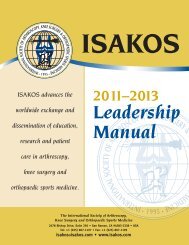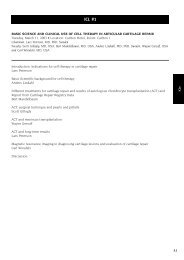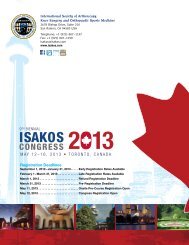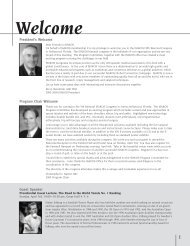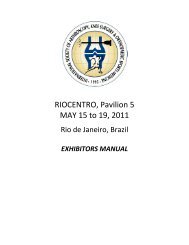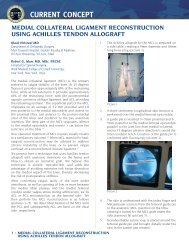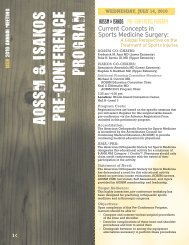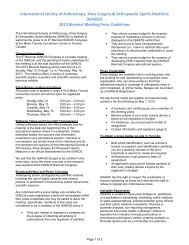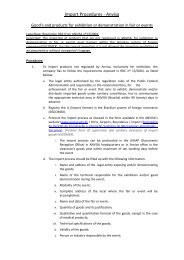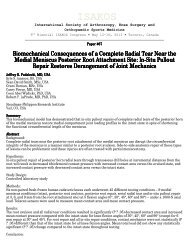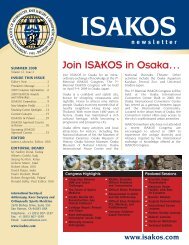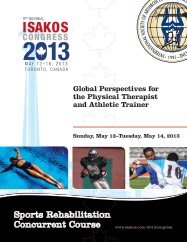POSTER ABSTRACTS - ISAKOS
POSTER ABSTRACTS - ISAKOS
POSTER ABSTRACTS - ISAKOS
Create successful ePaper yourself
Turn your PDF publications into a flip-book with our unique Google optimized e-Paper software.
Background: Arthroscopy of the knee is<br />
commonly performed as an outpatient surgical<br />
procedure and effective post-operative pain<br />
management continues to be a challenging<br />
problem. Previous studies have addressed postoperative<br />
management by examining use of intraarticular<br />
analgesia and/or modification of<br />
anesthesia techniques. No previous studies have<br />
however, evaluated the relationship between<br />
sleep deprivation and post-operative pain after<br />
knee arthroscopy. The purpose of this doubleblinded<br />
prospective placebo-controlled<br />
randomized study was to evaluate the<br />
effectiveness of a non-benzodiazepine hypnotic<br />
sleep-aid (zolpidem) in improving post-operative<br />
pain and fatigue in patients undergoing<br />
outpatient knee arthroscopy. <br />
Methods: Sixty-eight patients<br />
undergoing outpatient knee arthroscopy for<br />
treatment of meniscal tears and/or loose bodies<br />
were randomized to three treatment groups<br />
(ZOLPIDEM [24 patients], NONE [24 patients],<br />
and PLACEBO [20 patients]). All groups received<br />
post-operative hydrocodone and ibuprofen.<br />
Patients in the ZOLPIDEM group received a single<br />
dose of zolpidem for the first seven post-operative<br />
nights. Patients in the PLACEBO group received a<br />
gelatin capsule similar in appearance to zolpidem.<br />
Patients in the NONE group received only<br />
hydrocodone and ibuprofen.<br />
Results: Patients in the NONE<br />
group and PLACEBO group (no zolpidem<br />
received) demonstrated significantly worse mean<br />
daily post-operative pain scores on a visual<br />
analog scale when compared with the ZOLPIDEM<br />
group (p = 0.01 and p =0.04, respectively).<br />
Patients in the NONE group consumed<br />
significantly higher quantities of<br />
hydrocodone/acetaminophen post-operatively (p<br />
= 0.04) and had significantly more daily postoperative<br />
fatigue (p = 0.02) than the ZOLPIDEM<br />
group. Patients in the PLACEBO group also<br />
consumed higher quantities of<br />
hydrocodone/acetaminophen and had more daily<br />
postoperative fatigue although these differences<br />
did not reach statistical significance (p = 0.4 and p<br />
= 0.1, respectively). <br />
Conclusion: This study<br />
demonstrates that sleep and fatigue may be an<br />
important factor in the effective management of<br />
pain after outpatient knee arthroscopy. Future<br />
post-operative treatment regimens should<br />
address sleep and fatigue in order to maximize<br />
analgesic effects in these patients.<br />
E-poster w/ Standard #759<br />
Functional Outcome of the Arthroscopic<br />
Meniscal Transplantation Compared with the<br />
Open Meniscal Transplantation<br />
Herman Kaptijn, Leiden, NETHERLANDS,<br />
Ewoud Van Arkel, Den Haag, CK NETHERLANDS<br />
Presenter<br />
Westeinde Hospital, Den Haag,<br />
introduction:<br />
from 1998 on, 79 patients had a meniscal<br />
transplantation with a cryopreserved meniscal<br />
allograft. The first group of 63 consecutive<br />
meniscal allografts ( 57 patients) were<br />
transplanted through an open technique. The<br />
second group of 22 consecutive patients were<br />
operated through an arthroscopic assited<br />
technique. The purpose was to assess the<br />
arthroscopic technique on decreasing the<br />
rehabilitation period.<br />
Materials and methods:<br />
A retrospective cohort investigation in which the<br />
open technique of meniscal transplantation was<br />
compared to the arthroscopic assisted technique.<br />
Both groups were scored according to the<br />
Lysholm score pre-operative and at 6 months and<br />
12 months postoperative. The failures were<br />
analysed. To compare the groups a student-t test<br />
was used (p




